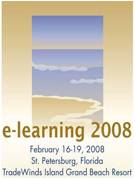
It is day two at the ITC eLearning 2008 conference, and this morning we heard a very engaging presentation by Myk Garn, Associate Vice President for eLearning/Executive Director of the Kentucky Virtual Campus.
Myk started the session by noting that conferences in general are filled with presentations on “best practices” but most learning occurs from failures. It is a point Wes Fryer has frequently made in his podcasts, bringing to our attentions the Disney movie “Meet the Robinson’s” and the movie’s point about failing forward! In fact, Myk noted that if you google “best practices” and “worst practices”, the best outnumber the worst by a factor of 174 to 1.
Myk’s blog noted why he shifted to focusing on worst practices:
“I had just sat though a wonderful presentation detailing how an information technology team had directed itself and its company though a massively complex software development and implementation process. At every turn they had faced problems and at each crossroads and conflict their management plan had guided them to success. Clearly this team and their project were a shining example of the “best practices” in IT development.
As I sat there I was both in awe of their insight and dedication to following their framework through thick and thin – and feeling depression as I reflected on my previous efforts to manage such projects myself. In contrast to their clarity of vision and incisive action my projects always seemed to find me in a muddle of data of questionable accuracy, unplanned problems of indeterminate cause or solution, and goals that shifted long before they were achieved. What, I mused, was I doing wrong? Was I the only person who failed to craft and lead such efforts? Or, was it possible, that these enlightened presenters had only told me about had gone right in their efforts? To be sure, they had mentioned problems, but their narrative showed how they had solved those with near prescient insight and skill. And ultimately their description of the best practices that had led them to success were indeed insightful and useful.
But, I wondered, I’ve always found I learned more when something went wrong than we things went right. While I was always happier when things were right, the heuristics that I rely on, the axioms that lead me into and through my next challenge, are those learned in the crucible of challenge. Instead of looking at what went right in a project – wouldn’t it be more educational (okay – and more entertaining) to look at what went wrong?”
Myk’s insight translated into a delightful interactive session in which members discussed their “dumb moments” and what they learned from them. Myk noted how few classic planning concepts work when disruptive technologies or concepts are introduced, and he resonated with me when he suggested the “READY / AIM / FIRE” model was outdated. He suggested FIRE first, though I have always been more aligned with a little pre-planning, or in my lingo, READY / FIRE / AIM. But we are brothers aligned in the basic concept.
One example he provided of where Ready/Aim/Fire is not  working concerns the concept of faculty developing and sharing learning objects through repositories (and I had a few years experience with this and the Georgia LOR for technical colleges). In contrast to LOR’s, Myk suggested we look at Cafe Scribe, a very non-SCORM compliant website where students create and share content between themselves.
working concerns the concept of faculty developing and sharing learning objects through repositories (and I had a few years experience with this and the Georgia LOR for technical colleges). In contrast to LOR’s, Myk suggested we look at Cafe Scribe, a very non-SCORM compliant website where students create and share content between themselves.
Myk noted that we need to learn to fail in an organized manner…and that we need to fail faster in order to learn more. Plans need to be directed towards learning as much as if not more than implementing.
All in all, a great keynote. Now it is off to some of the concurrent sessions.
Nice Skipper! I really like the idea of the approach that you describe here…kind of like the Open Notebook science project. It is indeed a shift to make more transparent the failures than to present knowledge as final form. Enjoy the rest of the show…